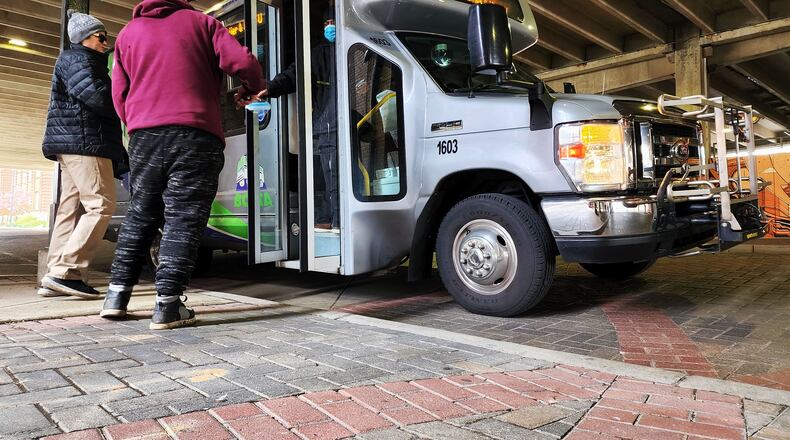“We’ve never really taken a wholesale, comprehensive look at the geographic area and the demographics and the system from the ground up,” Dutkevicz said. “And said this is what needs to be served because these are the people that need to be served and these are the needs... We’ve been pretty successful building a reasonable system but we’ve planned it in little pockets and silos.”
Part of the study is a survey that is live now at bcrtatransitplan.com until the end of the month. One question deals with funding: Today, BCRTA’s system is currently funded by federal funding/grants and contributions from Miami University. This question asks about support for a local tax dedicated to transit.
The 2022 budget projects $10.1 million in revenues, nearly half of it from the federal government, to support almost $8.2 million in expenses. Dutkevicz said they understand property taxes are unpopular. Most of the large transit systems utilize sale tax to fund their operations and Kimley-Horn — they are being paid up to $225,301 — will examine whether imposing a sales tax is warranted.
“I have no idea whether that’s palatable — that’s one of the questions, that’s why it’s on the survey,” he said. “It’s probably the most functional mechanism for a transit agency, they’re looking at all the options. It may be that they find we don’t need to provide a level of service that requires any additional funding. That’s why we sent them out to go look.”
About imposing a sales tax, board member David Fehr, who is also the county’s development director, said “we’re nowhere near that question yet, I think this is just to kind of gauge folks’ opinion on that, that would be a way off question in my mind.”
The BCRTA has had a tough time weathering the pandemic and its aftermath, just like most people and businesses. The biggest issue has been keeping and attracting drivers, they need 20 to 30 right now. Dutkevicz said he is proposing “a pretty hefty wage increase” of around 10% for entry level and a hike in the salary scale overall, plus they recently added medical benefits for the first time in more than 20 years.
He said the wage for inexperienced new drivers is estimated to go from $15.00 per hour to $16.50 per hour. New drivers with eight-plus years of passenger transportation experience will be at $20.29.
They will be able to do that using some of the $18.7 million they received from various federal COVID-19 funds, “but that was a one-time injection of cash, it’s not going to last forever.”
They are holding another hiring event on Saturday from 10 a.m. to 1 p.m. in their offices at 3045 Moser Court in Hamilton.
The hiring situation and the pandemic shutdown have tanked ridership, trips went from 620,037 in 2019; dropped to 222,714 during the height of the crisis and only bumped up to 342,393 last year. For the first two months of this year they have given 64,606 rides.
He said because of the staff shortages they have had to cut out almost all of their popular Bgo service which is door-to-door like Uber. Earlier this year they suspended a couple routes to deal with the problem.
“It’s tough and we were spreading our staff too thin, a lot of overtime was chasing people out the door,” Dutkevicz said. “So back when Omicron hit us, it hit us pretty hard and we had to make some tough choices about how to move forward and retain employees and make sure we could keep doing our core services.”
Fehr said he thinks the addition of benefits has helped with staff retention but this study should really help them move forward.
“There some concern that we’ve been having trouble recruiting people and looking at our finances,” Fehr said. “The idea was to reach in the communities, kind of like what do we want to be when we grow up.”
About the Author

